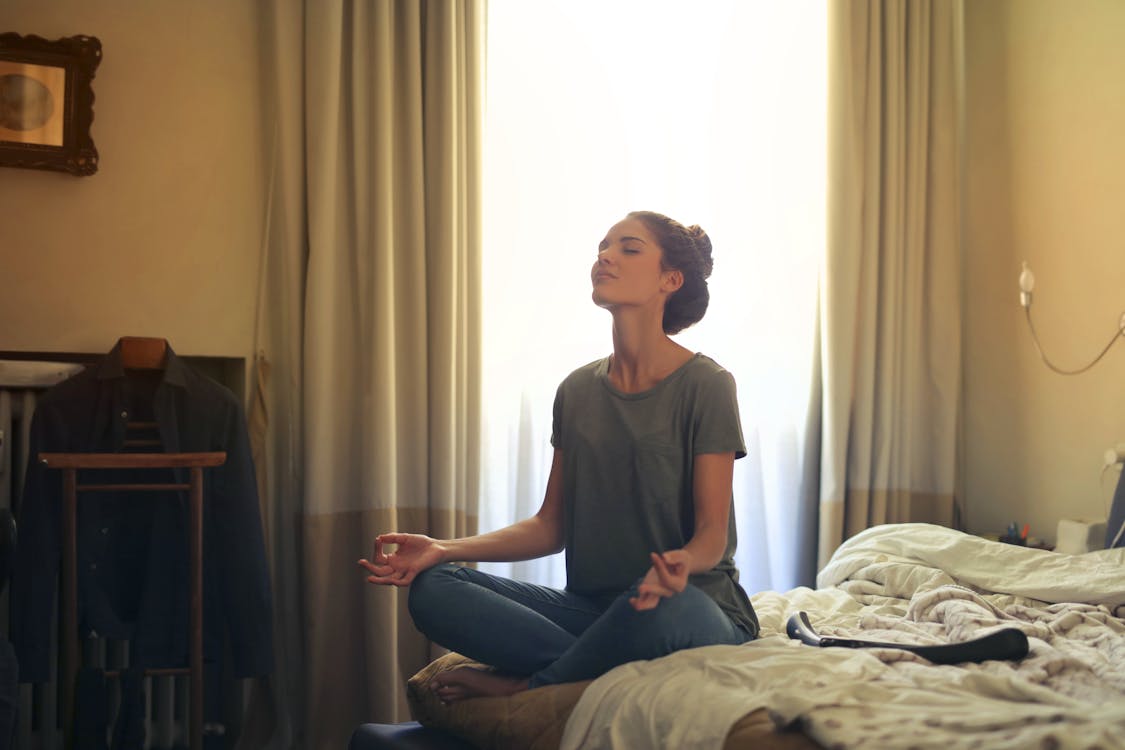Meditation: Meaning, Example, Benefits
Meditation, in its various types, involves focusing your attention on something specific for a purposeful and continuous period. This could be following your breath, repeating a mantra, thinking about a meaningful image, or deeply exploring a particular idea.
Mind-Body Connection in Yoga:
For people who love doing yoga, meditation is a crucial part of the whole experience. It plays a big role in connecting the mind and body, creating a special place where you can fully be in each moment.
This strong connection between the mind and body not only brings a feeling of inner calmness but also makes the overall yoga practice more effective. In the end, it adds up to a complete and well-rounded wellness experience.
Read Also:
Way To Improve Your Mental Health And Become Best Version Of Yourself
Everyday Meditation in Various Activities:
This idea shows that you don’t have to only meditate in a specific way; even everyday activities can become a sort of meditation if you do them with careful attention and full engagement.
Whether you’re lost in a fascinating book or taking care of a garden, these ordinary actions have the power to turn into a special kind of meditation when done with mindful attention and conscious involvement.
Cultivating Presence Beyond Formal Sessions:
Regular meditation is like a special tool for bringing you into the current moment, helping you be more mindful. It encourages you to be fully involved in what’s happening right now, creating a deep sense of awareness.
This heightened awareness doesn’t just stick to the meditation time; it spills over into how you deal with different parts of your life, making you approach things with a more purposeful, attentive, and aware mindset.
Personalized Approach to Meditation:
Knowing that meditation can be done in different ways, depending on what you like or do, shows how flexible it is.
This understanding points out the variety of ways to reach a meditative state, giving people the freedom to choose how they want to do it based on what they like and need.
Holistic Well-Being and the Multifaceted Impact:
Whether you make it a formal part of your routine or just do it casually, meditation has a big impact on how you feel inside and out. It’s like a magic tool that brings together different aspects of your life to make you healthier and happier.
Doing meditation, whether you follow a set routine or just do it whenever, is really valuable. It’s like a cool way to explore yourself, relax, and learn to focus better in life.
What Are the Benefits of Meditation?

1. Mind-Body Connection:
- The connection between the mind and body is like a dance in meditation. Meditation happens when we pay close attention, take deep breaths, or practice mindfulness. It’s a purposeful process that not only calms our mind but also helps us relax. This connection between the mind and body is vital for reducing stress.
- In meditation, we intentionally focus on our breath and thoughts. It’s like a dance between our mind and body.
- As we engage in these practices, our mind becomes calm, and our body relaxes. This intentional harmony between the mind and body is a key factor in reducing stress.
- The intentional process of meditation, involving focused attention and mindful practices, creates a peaceful connection between our mind and body.
Read Also:
Tips for a Good Night’s Sleep: Creating a Relaxing Bedtime Routine
2. Cortisol Regulation:
- The connection between meditation and cortisol, the main stress hormone, is interesting.
- Cortisol usually goes up when we’re stressed, triggering the body’s “fight or flight” response. Regular meditation, though, has been linked to how cortisol is produced, making our response to stress more balanced.
- In stressful times, our body releases more cortisol to prepare us for challenges. While this is necessary for dealing with immediate issues, having high cortisol levels for too long can lead to ongoing stress and health problems. This is where meditation comes in as a potential way to help.
- Meditation, which focuses on relaxation and being present, seems to have a calming effect on cortisol.
3. Relaxation Response:
- When we do meditation, something interesting happens called the relaxation response. This is when our body goes through changes that make us feel calm and peaceful. The response includes a slower heartbeat, lower blood pressure, and an overall feeling of being less alert.
- What’s special about the relaxation response is that it helps undo the physical effects of stress.
- Stress can make our body react strongly, like having a faster heartbeat or higher blood pressure. Meditation acts like a reset button, bringing our body back to a more balanced and calm state.
- The slower heartbeat during the relaxation response is important. It shows a shift from feeling on edge due to stress to a more relaxed state. As our heartbeat slows, it tells our body it’s okay to chill out, creating a peaceful feeling inside.
4. Mindful Awareness:
- Being aware in a special way, called mindful awareness, is a big part of meditation. In meditation, we’re told to look at our thoughts without deciding if they’re good or bad and to stay in the present moment.
- This helps us stop the cycle of repeating thoughts that often make stress worse. When we are more aware, we can respond to stress in a calm and controlled way.
- Mindful awareness is like a super useful tool in meditation. It helps us step back from our usual way of thinking and not get stuck in a loop of thoughts that bring stress. Instead of judging our thoughts, we just watch them.
- This simple act creates space between us and our thoughts, stopping the cycle that makes stress stronger.
Read Also:
Way To Improve Your Mental Health And Become Best Version Of Yourself
5. Emotional Resilience:
- Doing meditation regularly isn’t just about calming your mind; it’s like building a superpower called emotional resilience.
- This means you become better at handling life’s challenges with less difficulty. Meditation gives you a special time for self-reflection, a chance to think about things, and it helps you see stress in a way that doesn’t make you react too quickly.
- Practicing meditation all the time helps you deal with your emotions in a healthy way.
- Instead of ignoring them or running away from problems, meditation encourages you to look at your emotions without deciding if they’re good or bad.
6. Improved Coping Strategies:
- Mindfulness meditation, in particular, is like practicing important skills. It teaches you to be fully present in the moment, accepting things without judging them.
- This acceptance is a powerful way to cope with stress because it shifts your focus from fighting against stress to facing it calmly.
- Another important skill you learn through meditation is not getting too wrapped up in overwhelming thoughts.
- Stress often comes from having too many thoughts that feel out of control. Meditation helps you observe these thoughts without getting too caught up in their emotions.
7. Enhanced Sleep Quality:
- Stress and sleep often play a tricky game, where one can make the other worse. When stress is high, getting a good night’s sleep becomes tough. But if sleep is not good, it can make stress even stronger.
- This back-and-forth cycle is challenging, and that’s where meditation comes in. It’s like a helpful tool that can improve sleep by making you feel relaxed and calming down the busy thoughts that can keep you awake.
- And when you get enough good sleep, it helps bring down overall stress.
- The connection between stress and sleep is like a loop, and it’s not easy to break. Meditation, with its focus on helping you relax and quieting your mind, is like a secret weapon in disrupting this loop.

8. Accessible and Versatile:
- Mindfulness is more about doing it on your own, being present in the moment. Breathwork is simply paying attention to your breath.
- You can try guided meditation, where someone tells you what to do, or mindfulness, where you focus on the moment.
- Another way is breathwork, where you pay attention to your breathing. The cool thing is you can pick what suits you and fits into your daily life easily. Meditation is like a flexible tool that can be part of your everyday routine.
- The neat part about meditation is that it’s for everyone; you don’t need a special place or certain conditions. Guided meditation has someone guiding you through words or pictures, which is good if you like having direction.




